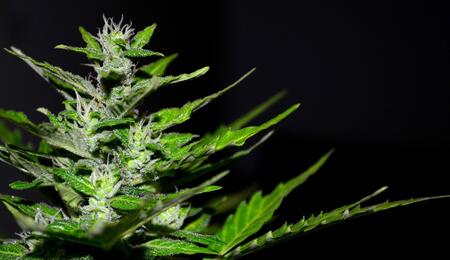High Potency Weed Linked to Bizarre 'Scromiting' Illness

The name of the disease stands for 'screaming' and 'vomiting.' It definitely doesn't sound like anything pleasant to experience. The condition might also lead to episodes of psychosis.
Scromiting is on the rise in the US, and doctors and health practitioners are becoming increasingly concerned about it. Scromiting is an informal name for Cannabinoid Hyperemesis Syndrome (CHS), a rare form of cannabis intoxication that might affect some chronic users.
Initial symptoms of scromiting may include people experiencing nausea in the morning, abdominal pain, and fear of vomiting. At a later stage, which could be weeks, months, or even years after the presentation of early symptoms—there are intense and overwhelming bouts of vomiting, pain in the abdomen, appetite loss, and persistent feeling of nausea. These symptoms can go on and off until the sufferer ceases cannabis consumption.
One unlucky sufferer of scromiting has commented the condition feels like "Edwards Scissorhands trying to grab my intestines and pull them out." The man - 17 at the time of his hospitalization - was unconvinced that the reason why he fell ill was his pot-smoking habit. Until he stopped smoking and all symptoms withdrew.
While taking a break or entirely stopping helps alleviate symptoms of scromiting, anecdotal evidence from sufferers suggests that taking hot showers also offers relief from the worst symptoms.
The increase in scromiting cases is strongly believed to result from the high percentage of THC current cannabis strains contain.
Over the past half a century, the strength and potency of weed have increased significantly. According to some research, between 1970 and 2017, THC concentrations have surged by 14% in cannabis flower. Whereas, between 1975 and 2017, the concentration in cannabis resin increased by 24%, equivalent to 5mg growth in THC annually. More findings suggest cannabis is around 50-70% more potent than weed samples from the 1960s and 1970s. New breeding and extraction technology, as well as market demand for more potent strains, are the driving factors that contribute to the increase of THC.
One of the states with the most reported cases of CHS or scromiting is Colorado, where the numbers kept growing following the liberalization of cannabis law in 2012. However, studies have had difficulties attributing CHS to increased cannabis use or people being more willing to report cannabis use. A significant number of diagnoses have also been reported in California, the first state that legalized medicinal weed in the 1990s and is currently a leader in the cannabis sector.
Health care providers describe scromiting as "an increasingly complicated and prevalent problem" and call for further investigation. In a few rare cases, the syndrome has also resulted in death, mainly through the dehydration it causes in sufferers.
In 2018, a teenager died after suffering recurring symptoms from the illness. Despite the presentation of symptoms, the teenager didn't stop smoking marijuana. An autopsy attributed his death to severe dehydration caused by CHS. In 2016, a study in the American Journal of Gastroenterology attributed two deaths of 41- and 48-year-old males due to dehydration caused by CHS.
When you think of marijuana and its array of medicinal qualities, including its ability to help cancer patients, it's strange that in some cases, it can have such a negative, counter impact on health. And perhaps here lies a warning and a question: where do we draw the line to our quest of searching the most potent weed? Or, while potent strains are okay, there comes a time when a user should skip a smoke, take a break, and, if necessary - entirely stop smoking for the sake of their health. Such would be the rare prospect of developing scromiting.
If by any chance you recognize that you develop symptoms of scromiting, or you see those symptoms in another cannabis consumer near and dear to you, take precautions and cease consumption. Consult your doctor and act timely to protect your health and well-being.



